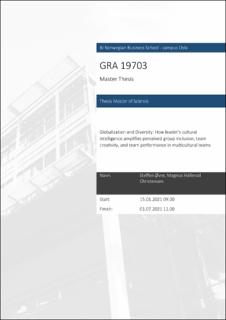| dc.description.abstract | This thesis examines the relationship between cultural intelligence (CQ) in leaders
and perceived group inclusion (PGI) among employees in diverse teams. Further,
it explores if virtual teams (VT) have a moderating effect on the relationship
between CQ and PGI. It investigates the relationship between CQ and
psychological safety (PS), the individual relationships between CQ and team
performance (TP), team creativity (TC), and turnover intention (TI), and the
individual relationships between PGI and TP, TC, and TI. We gathered data using
a self-questionnaire on 300 participants who worked in diverse teams and were
located in the United Kingdom (UK). To analyze the responses, we conducted
nine separate OLS regression analyses. We used the hierarchical method in SPSS,
where we entered the control variables before we entered the independent
variable. The results of our regression analysis supported a positive relationship
between CQ and PGI. We contribute to the literature by giving a nuanced
understanding of cultural intelligence among leaders and how it can be used to
enhance perceived group inclusion. Lastly, we discuss our findings in conjunction
with prior theory and literature within the scientific fields, together with
theoretical contributions, practical implications, limitations, and potential
directions for future research. | en_US |
